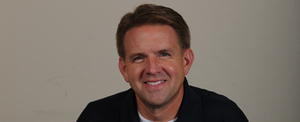Challenges necessitate business training for nonprofit leaders
Published: September 3, 2009 / Author: Nancy Johnson

On a muggy July afternoon, a group of students trickled into a classroom at the Mendoza College of Business, balancing carryout colas, salads and soups atop their stacked textbooks. The Master of Nonprofit Administration summer program attendees traded jokes with understandable jitters about an accounting quiz just minutes away.
One student, Dr. Michael Benson, was one of the crowd—and yet a little different.
While most MNA program students arrive with about 10 years’ work experience, Benson has packed more than the usual into his résumé.
He is president of Southern Utah University, in Cedar City, where he is something of a fundraising phenomenon. Two weeks into his presidency he announced a $3 million gift for the College of Science, the largest ever to a capital facility in SUU’s history. In his first year there, he helped raise more than $15 million, nearly triple the university’s previous record. Eight years ago, at age 36, he became Utah’s youngest-ever college or university president when he joined Snow College in Ephraim. At Snow, he set records in fundraising, amassing more in his five years there than in the college’s previous hundred-plus-year history combined. He is a cum laude graduate of Brigham Young University and earned a doctorate in modern Middle Eastern history at Oxford University.
One might ask what a university president and obviously accomplished fellow like this is doing in a Master of Nonprofit Administration program. The answer: strengthening his business skills.
“University presidents come from all kinds of disciplines—lawyers, sociologists, political scientists—but few come with a formal business or management training,” Benson said. Yet they find themselves running a multimillion-dollar business with hundreds or thousands of employees and often auxiliary services. “You are in meetings where financial knowledge is important,” he explained.
His MNA classmates agreed.
In the current poor economy, administrators at nonprofits are concerned about potential program cuts. Kate Hench, with the Chicago Children’s Museum, said it is more important than ever to be “business savvy.”
Ryan Heatherman, a judge advocate for the U.S. Marine Corps in California who operates a legal aid clinic for Marines, concurred. “We will learn business skills that we can carry into our practice.”
There’s more than business skills to the program. Mary Sacksteder, with Kettering Health Network in Dayton, Ohio, noted that she didn’t want to go online to get a degree. “I get so much out of the physical presence of being here.”
Benson explained the summer-camp atmosphere, heightened by late-night study sessions: “We have a really good chemistry. When you are together for eight hours every day, five days a week, you get to know each other really well.”
With all those hours in the classroom, professors get to know the students well, too. Accountancy professor Ken Milani said Benson was “a terrific resource” in class, especially when the topic was the importance of endowments and fundraising. “He gave his perspective from his work about handling salary increases with limited resources, which will always be an issue with nonprofits,” Milani said. At other times, Benson was just another student whose background is not in finance and accounting, who was “working and struggling like anyone else.”
Because many students in the program don’t have a business background, some courses are tailored for them. Rather than just plug in a standard accounting course, the professors craft a course that begins with an introduction to business and proceeds with accounting terms that are specific to the nonprofit world, such as surplus and deficit rather than profit and loss.
Though some students think of algebra as “bone chilling,” they do just fine with numbers, Milani said. “I tell them, “This time you will really care what X equals. It will mean how many patients you can serve, how many people you can help.”
Serving others is at the heart of the MNA program, Milani said, noting that it dates back to 1953. “This is the way Notre Dame gives to the community, training students to go into meaningful positions around the country.”
/news_and_events/news_articles/article/4144/challenges-necessitate-business-training-for-nonprofit-leaders




